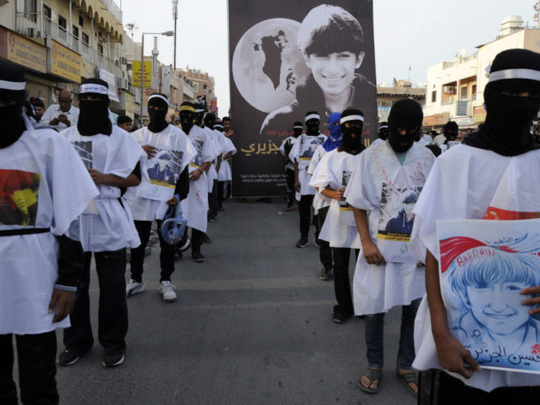
Manama: The latest round of National Dialogue talks continued on Wednesday night, with a bloc of pro-government political societies and MPs adamant that the opposition publicly declare their condemnation of continuing street violence.
That street violence flared last weekend on the second anniversary of the political schism that has divided this island kingdom since then.
Anti-government demonstrators are demanding greater political rights and better social and economic prospects.
The government is trying to build consensus on the future of the kingdom, but argues that violence has to be quelled first, fearing the influence of Iran is stoking the agitators. Earlier this week, it revealed that a Revolutionary Guard and three others from Iran had set up a sophisticated terrorist cell in Bahrain, luring in eight locals to subvert the kingdom.
Last week’s street violence claimed the life of a 24-year-old Pakistani policeman, who along with three injured colleagues, was caught in a fusillade of petrol bombs hurled by teens.
A rioting 16-year-old boy also died when he was hit by a blast of shotgun pellets on a street corner in the village of Diah.
For the politicians trying to reach a consensus at a hotel retreat near the Formula One Circuit, quelling the violence is a primary and immediate objective. But it’s not going to be an easy task, given the entrenched attitudes among anti-government protesters and their commitment to carrying on the street violence.
At a trucking company office in Diah, adjacent to the spot in the street where 16-year-old Hussain Ali Al Jazeeri died last weekend, his father, brother and uncle sit and reflect on the week’s events.
“I always knew my son was going to die as a martyr,” Ali Ahmad Al Jazeeri tells Gulf News. “Every time he went out, he wore white, hoping that it would be his death shroud.”
But as a father, couldn’t he prevent his son from rioting in the streets?
“No one could have stopped him,” he says. “He was at Pearl Roundabout right from the start. He wanted to do his part,” he said referring to the monument that served as a symbol of the protest movement until it was removed by the government.
According to his father, Hussain was hit at close range by a blast of bird shot pellets to his lower right torso. And as he was dying, he says his son was struck a second time.
Hussain was part of a violent opposition street group that lobbed anything they could — and petrol bombs — at police on the main street of the village.
And he was also a teen seasoned in dealing with police — he had been arrested and jailed earlier for riotous behaviour.
“He couldn’t be stopped,” his father says. “He and all of his friends, all they wanted to do was protest.”
The protesting cost Hussain his life. His brother, 11-year-old Mohammad, wants to follow in his dead brother’s footsteps. He fidgets with a crumpled chocolate bar wrapper as the adults talk. But when asked, he answers; “I want to be like Hussain.”
His father says that with Hussain’s death, he will have two more sons to replace him so that they can continue their struggle.
But what about negotiating and ending the cycle of violence?
“This National Dialogue is just talk for the politicians,” Ali Ahmad says. “But we need to continue the violence until we get our rights.”
Ali Ahmad’s brother, Saeed, owns the trucking and cargo company. He had hoped his son would join him, but that’s not an option for the next decade. Maktar Saeed, who is 18, will be spending the next 10 years behind bars for rioting and street violence. He was convicted on Tuesday and also ordered to pay restitution of 15,000 Bahraini dinars (Dh146,000).
“No father wants to see his son in jail,” Saeed says. “It’s a waste of the next ten years. And for what?”
Outside on the street, burnt palm tree trunks and broken bricks lay, ready to be moved into position come the evening riotous behaviour.
For those meeting twice a week at the National Dialogue talks, reaching an agreement is one thing, but trying to sell it to families like the Al Jazeeri’s is another. Ali Ahmad’s other teen son is taking to the streets, and his father can’t — or won’t — stop him.












